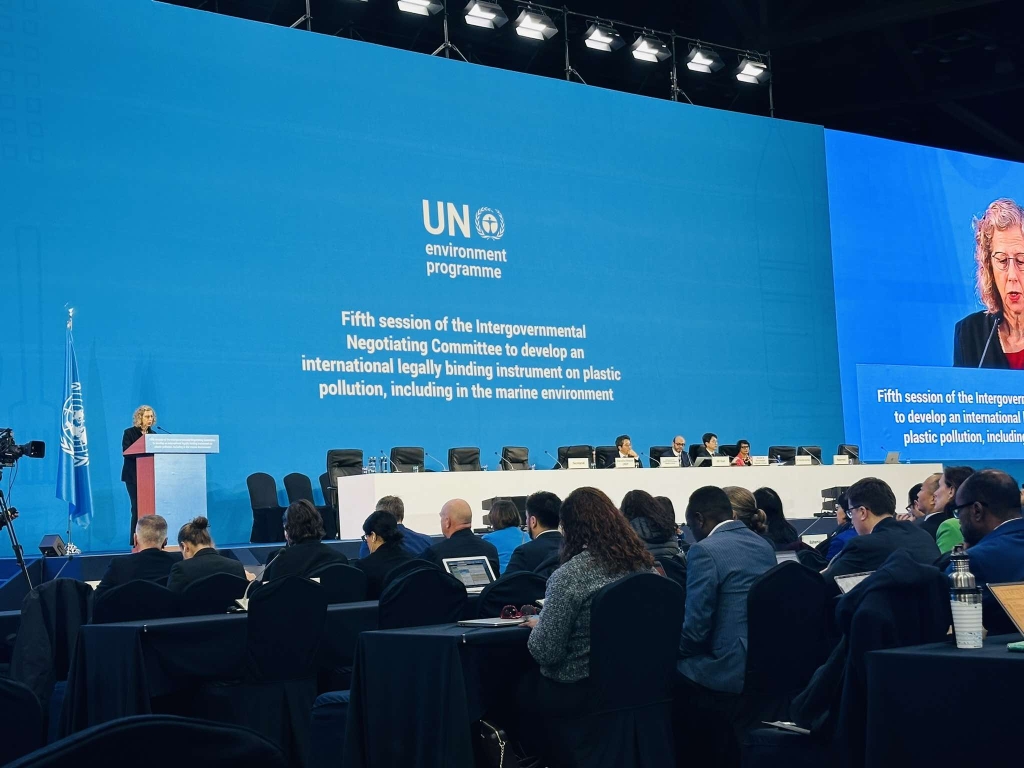
Over 190 governments now negotiating a new treaty on plastic pollution have been urged to deliver a global agreement that will protect everyone’s health.
More than 900 independent scientists have signed a new declaration calling UN negotiators to agree on a comprehensive and ambitious global plastics treaty based on robust scientific evidence to end plastic pollution by 2040.
Day one of negotiations under the Fifth Inter-governmental Negotiating Committee to develop an international legally binding instrument on plastic pollution including in the marine environment (INC5) began today in Busan, Republic of Korea. The session will end on 1 December upon which an agreement should be complete.
Approximately 460 million tons of plastics are produced annually, and production is set to triple by 2060 under current business-as-usual growth rates.
According to the Scientists’ Declaration the harm caused by plastic pollution cannot be prevented by improvements in waste management alone.
For the treaty to be effective, the declaration states that plastic pollution should be addressed via the waste hierarchy, prioritising reduction and time-bound elimination of primary plastic polymer production, redesign, reuse, refill, repair, repurpose and remanufacture, and safer and more sustainable waste management.
“A successful, effective, and comprehensive global plastics treaty depends on independent and robust scientific evidence, the lived expertise of frontline and fenceline communities, and the wisdom of Indigenous rights holders,” said Professor Trisia Farrelly, a Senior Scientist at Massey University and Cawthron Institute of New Zealand.
Independent scientific evidence shows that plastics production and use exceed our ability to prevent pollution and harm. Plastics and their associated chemicals are transboundary and pollute every part of the planet, including human bodies. The scientific community has researched the sources, fate, and effects of plastics pollution for decades, leading to the adoption of a United Nations resolution to negotiate the global plastics treaty.
“This community continues to support INC delegates through the negotiating process with broad, independent, and multidisciplinary science to enable evidence-based decision-making,” said Professor Farrelly.
The Scientists’ declaration now open for signing by independent Scientists for a legally binding agreement that will regulate production, use, and emissions of plastic chemicals, including polymers and groups of chemicals as well as ensure transparency by disclosing health, safety, and sustainability information about plastics and their composition.

“We’re now in the final stages of having a strong legally binding agreement on plastic pollution. For the sake of all humanity, we need strong text on the table – plastic is everywhere on earth, nowhere goes untouched. With this declaration we have the science we now need the will to act. We must end plastic pollution before plastic pollution ends us.,” said Mr Anthony Talouli, Director of Waste Management and Pollution Control of the Secretariat of the Pacific Regional Environment Programme (SPREP).
“Plastic is now even found in human beings, the impact of which we are still learning about. Everything that can be done to urge and empower negotiators to create an agreement to protect the health and environment of our global community is commendable. We congratulate all the scientists for creating and signing this Declaration.”
To access and read the full declaration please click here.
For Independent Scientists to sign the declaration please click here.
The fifth Intergovernmental Negotiating Committee to develop an international legally binding instrument on plastic pollution, including in the marine environment is taking place in Busan, Republic of Korea, from 25 November to 1 December 2024.
The Pacific Islands are represented by the Cook Islands, Federated States of Micronesia, Fiji, Kiribati, Marshall Islands, Nauru, Niue, Palau, Papua New Guinea, Samoa, Solomon Islands, Tonga, Tuvalu and Vanuatu through the support of the Government of Australia and the United Nations.
They are supported by the Secretariat of the Pacific Regional Environment Programme, working with partners the Pacific Islands Forum Secretariat, Office of the Pacific Ocean Commissioner, The Pacific Community, Forum Fisheries Agency, Environmental Investigation Agency, Centre for International Environmental Law, University of Wollongong, WWF and Massey University.
For more information, visit:https://www.unep.org/inc-plastic-pollution/session-5